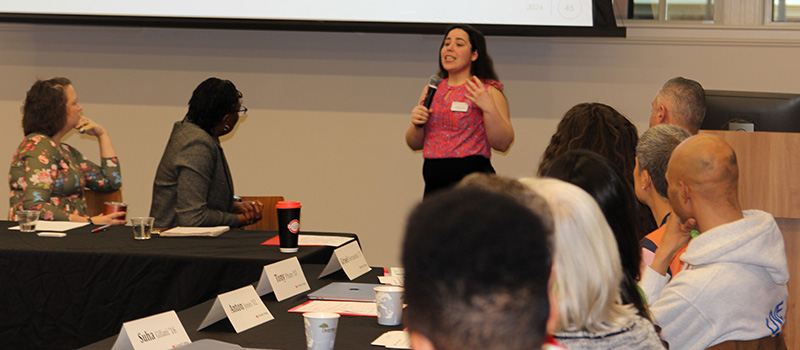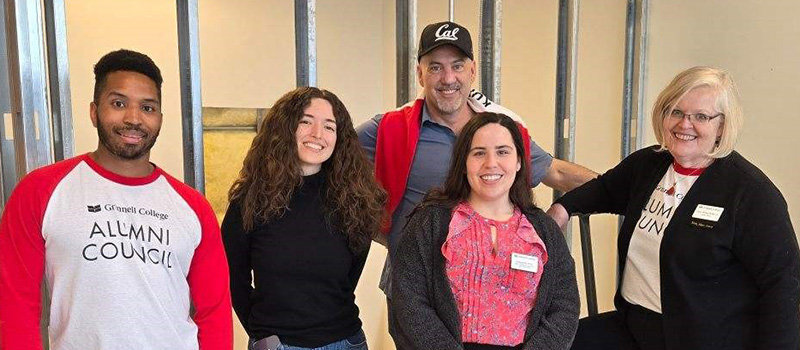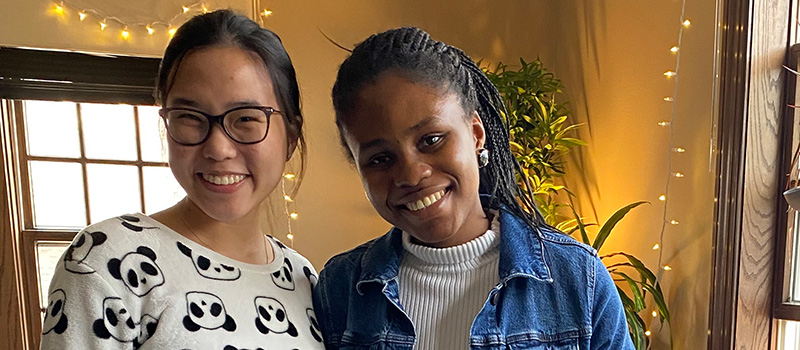Alumni Council helps establish First Gen Low Income Lounge in JRC
April 16, 2025 — The idea that first-gen, low-income students are proud and vocal about their identities contrasts from when Alumni Council member Dawn Helsing Wolters ’87 attended Grinnell College in the 1980s.
“There was a bit of a stigma attached to that status back then,” Wolters says. “To see how things change and how affinity groups and these kinds of identities are celebrated and seen as assets is really encouraging. It’s an important thing to lift up.”
To that end, the Alumni Council spearheaded a fundraising effort that resulted in more than $21,000 for a lounge and community room for First Gen Low Income (FGLI) students. The space will be a dedicated area for students to study, relax, and build a sense of belonging on campus.
 Maggie Bell ’17, associate director of first-generation & low-income student programs, makes a presentation about FGLI students at the Alumni Council meeting on April 4.
Maggie Bell ’17, associate director of first-generation & low-income student programs, makes a presentation about FGLI students at the Alumni Council meeting on April 4.
The lounge is under construction on the third floor of the Joe Rosenfield ’25 Center (JRC) with the intent of opening in time for the 2025 fall semester.
“Our goal is really for this to be a multi-functional, student-centered space,” says Maggie Bell ’17, associate director of first-generation & low-income student programs. “We want the students to feel ownership of this and to craft it as a space where it can be their go to for anything: studying, socializing, or connecting with resources. I think it’s going to open up a lot of opportunities to even expand some of our programming because now we’ll have a space to really do new and fun things.”
Approximately 17% of Grinnell’s student body identifies as first generation (neither parent graduated from college) and low income. While FGLI resources like the food pantry and low-income lending library are in the Center for Religion, Spirituality, and Social Justice (CRSSJ), there hasn’t been a centralized space carved out for students comparable to what some of the other groups on campus have, Bell says.
“The concept of a student space that’s centered around FGLI students is something that students have been requesting for years,” Bell says. “Historically, higher education was not created for people from marginalized or underrepresented backgrounds. So I think that when we begin carving out physical space for students from underrepresented backgrounds, it shows that Grinnell values the unique and diverse experiences that first-gen and low-income students bring to campus.”
During its fall meetings on campus, the Council met with JC Lopez, vice president of student affairs, to explore ideas for how a targeted fundraising effort could support Grinnell’s FGLI students. The lounge idea materialized from that conversation.
 Several Philanthropy Task Force members joined Maggie Bell ’17 for a photo in the under construction FGLI Lounge. Pictured are Ben Vaughn ’15, left, Grisel Hernandez ’17, David Kurzman ’96, Bell, and Dawn Helsing Wolters ’87.
Several Philanthropy Task Force members joined Maggie Bell ’17 for a photo in the under construction FGLI Lounge. Pictured are Ben Vaughn ’15, left, Grisel Hernandez ’17, David Kurzman ’96, Bell, and Dawn Helsing Wolters ’87.
The Alumni Council’s Philanthropy Task Force, chaired by Wolters, led fundraising efforts, initially starting with a campaign within the Council’s 26-member group. Then on Feb. 10, a public launch of the initiative began. Alumni Council members reached out to fellow Grinnellians for support.
While the initial goal was $10,000, by the end of February $21,100 had been raised.
“Alumni Council exists to help connect alums to campus,” Wolters says. “Reunions and events are great to extend the community we experienced as students, but to bridge the gap to help alums connect with the College today, to me that was the driving force. This was identified as a priority. I think it gives us something to show to alums. It’s easy to see the impact.”
While back for the spring Alumni Council meeting April 3-5, the Philanthropy Task Force – Wolters, Jay Dick ’93, Grisel Hernandez ’17, David Kurzman ’96, and Ben Vaughn ’15 – got to see the space in the JRC where the lounge is being built.
“We’re really grateful for all the support from the Alumni Council,” Bell says. “It means this didn’t have to be a half-hearted measure; it could really be well done. It’s incredible they doubled the goal, which allows us to dream a little bit bigger.”
FGLI students are helping design the lounge. “Everything that I do, I try to uplift student voices, so I’ve really looked at this space through a framework of co-creation,” Bell says.
 Luyen Pham ’26, left, and Anu Sanumi ’26 take a look at the Partners’ Study Lounge as part of the FGLI Advisory Committee’s tour of campus cultural centers.
Luyen Pham ’26, left, and Anu Sanumi ’26 take a look at the Partners’ Study Lounge as part of the FGLI Advisory Committee’s tour of campus cultural centers.
The first-gen, low-income advisory committee recently toured cultural centers on campus, so students could get an idea of what exists and what ways other groups are integrating identity into physical spaces. The committee visited the Black Cultural Center, the Disability Cultural Center, the Academic Advising’s Partners’ Study Lounge at Steiner Hall, and the Stonewall Resource Center. Bell will hold a debrief with the students about it soon. She also gained feedback from a FGLI mentoring lunch (which includes first-generation students, faculty, and staff) where the topic was the lounge.
Since it’s never too early to discuss color schemes, on April 3 Bell held a swatch survey, “where we had an array of paint swatches and students could nominate a color or colors. I would say we were seeing a lot of blues and purples,” she says.
Bell, an FGLI student herself, started her position in 2022. Among her many roles is event planning. Her programming fits into three buckets: community-based, resource utilization, and identity development.
Community-based events are time to be together and often involve hands-on activities like creating diamond art or having a dirty soda bar where students could make their own concoction of drinks. Resource utilization connects FGLI students with campus partners where they can learn things like how to study abroad or what goes into financial aid packages. An example of an identity development event was the critical consciousness group where students talked about experiences of identity on and off campus.
“We talked about not only being first gen and low income, but also a lot about race and gender in the intersection of that and the way we experience those identities here at Grinnell, and then we connected them to larger power structures,” Bell says.
The lounge’s opening is a significant way to show FGLI students they belong here, and the College values them, Bell says.
“I think it has massive symbolic value to students,” she says. “And hopefully also to alumni who went through the College experience and maybe didn’t feel like they had support systems in those ways. They can now see that the College is evolving to better support these students.”
—by Jeremy Shapiro